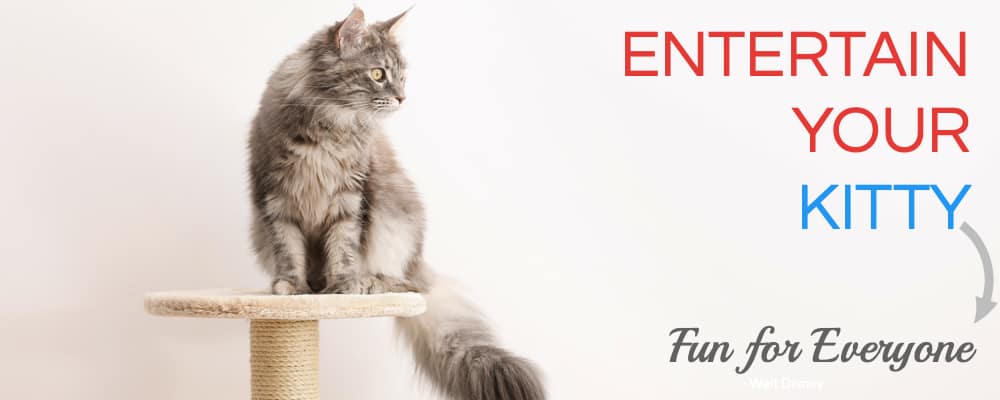In this blog we will discuss how to improve your cat’s happiness through enrichment, stimulating the senses, providing safe outlets for natural instincts, and cat-friendly spaces and elements.
A happy enriched cat is one who feels both comforted and stimulated by its environment, which involves places of safety and comfort, ways to express feline instincts, stimulation to remain active and engaging toys and interaction.
Though your cat may seem happy lying about the house and receiving endless amounts of affection, it’s important to remember that cats are predators and explorers by nature. Providing opportunities for your cat to act on these feline instincts is a core component of an enriching environment.
Cat Spaces – It’s the Climb
Cats naturally desire high places they can reach by climbing, as vertical spaces facilitate adventure as well as safety and security. Your cat’s opinion of its environment can be elevated by facilitating this vertical space via cat trees, as well as by implementing creative shelf and furniture arrangements. Older cats that enjoy having the sun warm their bones may appreciate a sturdy, soft perch to nap on by a window. Providing these spaces expands both the physical environment for your cat, and their overall happiness and sense of security. Cats without this type of climbing enrichment may go ahead and create their own by jumping on the kitchen tables and counters; it is important to realize that this is not just acting out, and it’s a natural instinct that absolutely needs a healthy outlet! Tree furniture usually also has bark or carpet material for your cat to scratch up – another must-have as an outlet to express their normal behavior!
Outdoor Refuge: The Catio
Owners with some building skills may consider constructing a catio, which is an outdoor enclosure that allows your cat to explore and play outside. Many catios are created with screened walls, and often allow cats to enter them via a window. Populating this space with your cat’s toys, small, non-toxic plants, and maybe even a log or tree for scratching will be well received. Catios are also a safe way to ensure your indoor cat gets to spend time outdoors safely.
The Perfect Indoor Hiding Refuge
Ohio State University’s Indoor Pet Initiative has the best guide for creating an indoor cat refuge. Choose a spot or a room that is rarely visited by anyone else, and fill it with your cat’s necessities and toys. The purpose of an indoor refuge is for your cat to have its own quiet space to hide away and feel safe at leisure and without fear of interruption. This is especially important for anxious cats. Cats also enjoy hiding in tents or cubes.
Dinnertime
Cats appreciate a more predatory eating experience, and enjoy being engaged in feeding both mentally and physically. One way to provide an engaging challenge for your cat is to place its food in a puzzle feeder like the Doc & Phoebe feeder. Puzzle feeders simulate the stimulating challenge of hunting down food, as well as giving your cat a fun way to exercise! There are plenty of DIY options, all of which should be used under supervision. There are also more advanced durable options to purchase. These toys, activity boards, and feeding activity stations are designed to stimulate your cat’s brain and engage all five senses to provide enrichment, fun, and treats. Plus they help keep your cat lean, which keeps them healthier and leads to longer life.
Playtime
Indoor cats can feel large amounts of stress if they aren’t active enough. Classic examples of solitary cat toys include the Star Chaser and Babble Ball, which are perfect for cats who find themselves home alone due to their human’s work schedule. A newer, interactive toy is the Mousr. Despite popular belief that cats are solitary creatures, it’s important to spend a lot of one-on-one time playing together, as social interaction is crucial to their happiness and well-being (and yours too)! Some cats may even enjoy adventurous activities with you, like hiking or even a walk in your neighborhood or back yard.
Your cats might not be interested in a brand new toy you brought home, but this doesn’t mean that they don’t care about any toys or games at all. Each cat has a unique toy preference, based on prey preference. You can figure out prey preference by observing how they react to toys with specific qualities (feathers, rattles, etc.). Similarly, cats enjoy variety and may need a lot of different types of toys to cycle through. It’s important to find what types of cat enrichments are best suited for your cat’s unique purrsonality.
